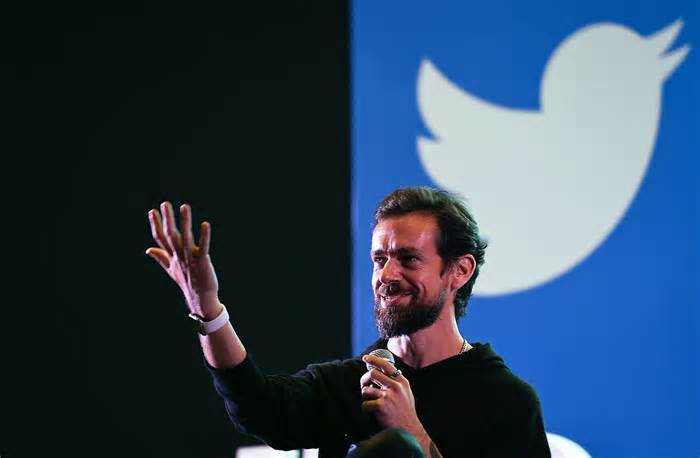In this file photo taken on November 12, 2018 Twitter CEO and co-founder Jack Dorsey gestures while interacting with students at the Indian Institute of Technology (IIT) in New Delhi.
In this file photo taken on November 12, 2018 Twitter CEO and co-founder Jack Dorsey gestures while interacting with students at the Indian Institute of Technology (IIT) in New Delhi.
In this file photo taken on November 12, 2018 Twitter CEO and co-founder Jack Dorsey gestures while interacting with students at the Indian Institute of Technology (IIT) in New Delhi.
In this file photo taken on November 12, 2018 Twitter CEO and co-founder Jack Dorsey gestures while interacting with students at the Indian Institute of Technology (IIT) in New Delhi.
The New York Times podcast The Daily hosted Twitter CEO Jack Dorsey this morning in a wide-ranging 40 minute interview where host Michael Barbaro asked Dorsey about everything from alternate paths the company may have taken to Twitter’s responsibility in spreading political misinformation.
Dorsey questioned many of his company’s initial design decisions, expressing regret that they hadn’t consulted game theorists on the effects of featuring follower numbers and like counts so prominently in the site’s design.
He also floated three potential new features that the company is considering, although was not specific about how or when they would be rolled out.
“One of the things that we’re experimenting with,” says Dorsey, “is a small little feature where if you retweet an article that you haven’t actually even opened to look at, to read, we will give you a notification that says, ‘hey you haven’t actually looked at this, are you sure you want to spread it?’”
A second feature is making their algorithms more transparent, allowing users greater freedom over what content arrives in their feeds, either by choosing from several algorithms or even creating their own.
The third is specifically designed to break through information bubbles that users may find themselves in, advertently or inadvertently.
“Another experiment that we’ve run in the past and that we’re running which is for any particular article that is shared, you might see one point of view in this direction, another point of view that is slightly different, and another point of view that is completely different.”
RELATED: Twitter user suspended for posting same tweets as Trump
Dorsey went on the discuss a range of other topics, including how Twitter will change in the next three to five years. It was the most contentious exchange of the interview.
Dorsey expressed enthusiasm in Twitter’s ability to break down language barriers via translation, and stressed that as Twitter expands, the diversity of viewpoints will police bad actors and ultimately uplift the discourse on the service.
“I don’t know what the time frame is, but you’ll see a Twitter that has this blurring of a very localized conversation, whether that locality be cultural or geography-based or topically-based…
Barbaro then interjected, pointing out that this was essentially positing growth as a solution, and that previous global expansions have led to consequences that are horrible, even genocidal.
Dorsey countered that more attention on those global problems is helpful, and that acknowledging them can help solve problems and can jump into the conversation even if they’re geographically far-flung.
RELATED: The funniest tweets about the pandemic from Bay Area comedians
Another contention exchange happened when Barbaro flatly asked Dorsey if he would be willing to ban Donald Trump’s account in the case that he violated the terms of service, citing another recent high profile banning of controversial conspiracy theorist Alex Jones.
“We hold all accounts to the same rules. But if there are particular egregious aspects of violations over terms of service, we won’t hesitate to take action.”
The interview concluded by Barbaro asking a hypothetical as to what will happen if Trump takes to Twitter after the election and falsely declares himself the winner. Not surprisingly, Dorsey didn’t commit to an answer, and instead cited the necessity to learn from the controversy surrounding the Gore-Bush election, then stressed that protecting the integrity of the conversations around elections is the company’s top priority.
Dan Gentile is a culture editor at SFGATE. Email: [email protected] | Twitter: @Dannosphere

